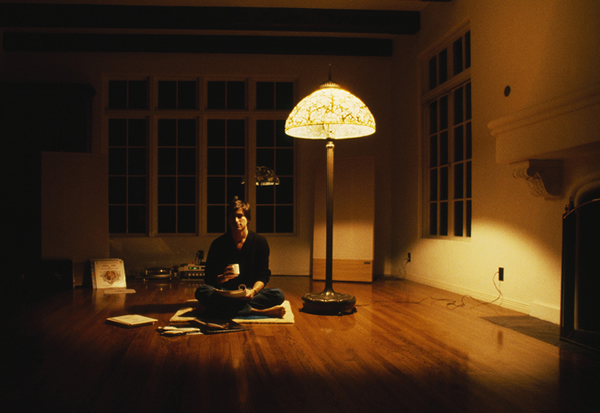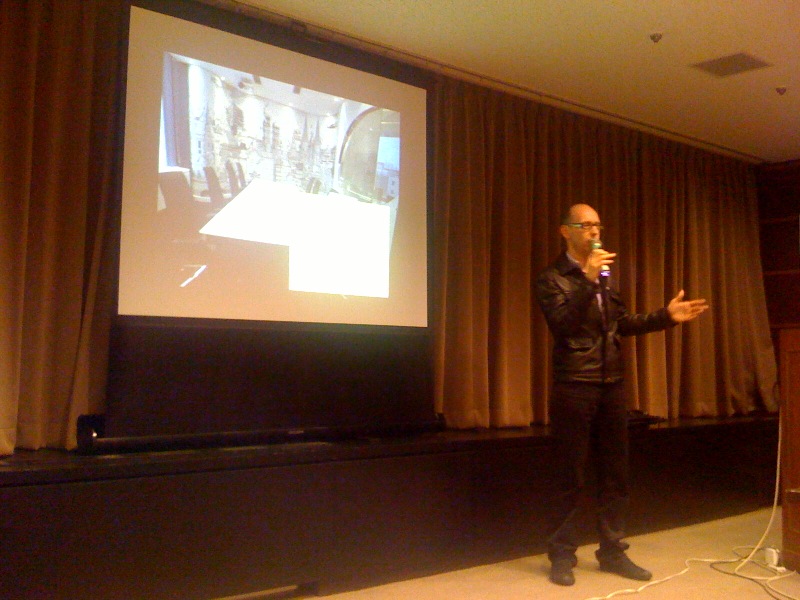Banksy’s new work, great as usual:
Author Archives: admin
‘s office
Bitfall
As soon as we have a client who can afford to have it, I want to use this in their reception. Bitfall, a rain-printing machine developed by Julius Popp of Spherical Robots
Â
Â
Entrepreneur Association
Back to basics
An interesting new trend according to Designboom is the return to low-tech equipment:
“As technology evolves, new innovations are constantly replacing old ones. this cycle is repeated over and
over until old technologies are almost completely forgotten. whether this is good or bad is really in theÂ
eyes of the beholder, but the pace of technological innovation is unavoidable. in the past this technology
turnaround was slow and measured, but it has been steadily increasing to a rapid clip today. so fast in fact,
that many of us have trouble keeping up.Â
in spite of these hurried times, some of choose to stick with what we know or look back in history.Â
rather than listening to music on an mp3 player, some choose to listen to lp records and rather than designÂ
a poster using the latest computer software, some choose to use an antique letterpress. this burgeoningÂ
trend of anti-digital activity can perhaps be attributed to a form of technology nostalgia but there is clearly
something more. for starters, many of the people turning to retro-tech weren’t even born when these
original products were around. there is something else at work, perhaps something is missing from the
future-forward disposable technology of today? with each new generation of technology we loseÂ
something from the past, the comforting sound of the needle on vinyl or just getting our hands dirtyÂ
instead of messing around with a mouse.Â
high technology may be the zeitgeist of today, but every trend has its adversary. today this adversary takes
the form of vinyl records, film cameras, typewriters and other relics form the past. perhaps we seek comfort
in the familiar or just need a break from our digital lifestyles. no matter what the reason, there is a clear
movement at work that can be seen throughout contemporary culture. looking into the future, the products
and tools we use today may soon be added to this list of antiquated technology, awaiting a resurgence of
there own.”
Personally, I enjoy using some of these old analogue synths, such as the fantastic Korg Ms20.
Starck, a star…
Philippe Starck as a star in a reality show on the BBC, called “School of Design“:Â
“Imagine that you left design school last summer, and have been looking for work ever since. You’re offered the chance to compete for a job with the world’s most famous designer, but there’s a hitch, in fact there are several hitches.
One is that said designer is Philippe Starck, the aging enfant terrible of French design, who says ”” or screams ”” what he thinks in fluent, if often incomprehensible Franglais. Another is that when, at your first meeting, you describe a chair you’ve designed as “a sculptural piece,” he erupts with fury: “I hate it when you say sculpture. You repeat it, and you do not even finish the day.” But the biggest hitch is that all of this will soon be on television.
The hapless young designer is one of a dozen hopefuls who are vying for what is clearly the mixed blessing of working chez Starck in “Design for Life,” a British reality TV series to be broadcast by the BBC next month. The star is Mr. Starck himself, a shameless show-off who is so brazen, exuberant, charming and silly that he not only outshines the contestants, but reduces them to stricken silence for much of the time.”
more here
To get an idea of what to expect:
Â
e-cigarettes
As more and more offices are becoming smoking free, maybe e-cigarettes are an option to those horrible yellow-stained  smoking rooms. (via Green ITers)
Â
Why do we work?
Why indeed? A question I posed at Linkedin. Todd Gates is posing a lightly different question when he asked: “Why do we have to work” in his book Hunting, Gathering and Videogames. Watch him explain his ideas below, very interesting indeed.
“PART I: WHY DO WE HAVE TO WORK?
Chapter One
*Hunting, Gathering, & Videogames* gives a historical overview of why we’ve always had to “go to work,” tracing the common link between the workday of the prehistoric hunter and gatherer, the first millennium B.C. farmer, the first century A.D. pottery-maker, the nineteenth century assembly line worker, and today’s videogame programmer. ”
Â
Statistics
Google NYC
All of Google’s offices are so cool. Here’s a video of the New York office. (via Office Snapshots)


